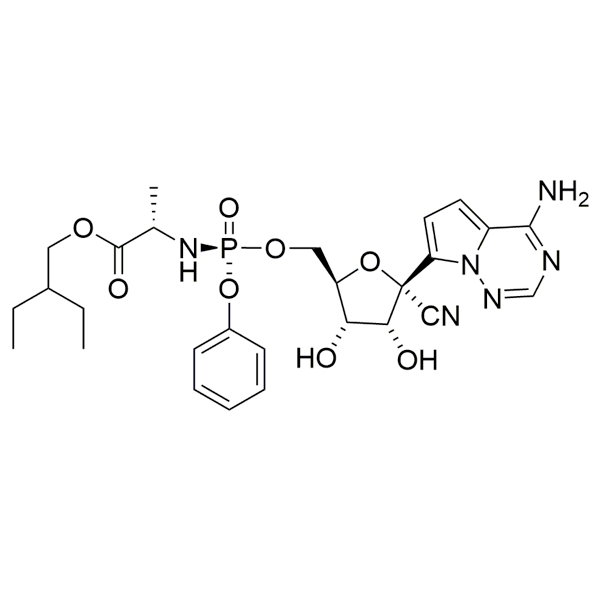Chemical Properties:
Package: Bottle, Aluminum foil bag, Cardboard drum, 25kg/Drum, or according to customer's requirement. Storage Condition: Store in sealed containers at cool and dry place; Protect from light, moisture and pest infestation.Manufacturer Commercial Supply Remdesivir and Related Intermediates with High Quality Remdesivir CAS 1809249-37-3 2-Ethyl-1-butanol CAS 97-95-0 Trimethylsilyl Cyanide CAS 7677-24-9 4-Nitrophenol CAS 100-02-7 2-Ethylbutyl ((S)-(perfluorophenoxy)(phenoxy)phosphoryl)-L-alaninate CAS 1911578-98-7 N-[(S)-(4-nitrophenoxy)phenoxyphosphinyl]-L-Alanine 2-ethylbutyl ester CAS 1354823-36-1 (S)-2-Ethylbutyl 2-Aminopropanoate Hydrochloride CAS 946511-97-3 Remdesivir Metabolite (GS-441524) CAS 1191237-69-0 Remdesivir N-2 Intermediate CAS 1191237-80-5 2,3,5-Tri-O-benzyl-D-ribonolactone CAS 55094-52-5 7-Bromopyrrolo[2,1-f][1,2,4]triazin-4-amine CAS 937046-98-5 Pyrrolo[1,2-F][1,2,4]Triazin-4-Amine CAS 159326-68-8 4-Amino-7-iodopyrrolo[2,1-f][1,2,4]triazine CAS 1770840-43-1| Item | Specifications |
| Appearance | White to Off-White Solid Powder |
| Identification A | IR: The infrared absorption spectrum of the product should be consistent with that of the reference substance |
| Identification B | HPLC Retention time similar to reference substance |
| Specific Rotation | -19.0° ~ -22.0° |
| Solubility | Solunle in Methanol, Sparingly Soluble in Ethanol, Slightly Soluble in Acetonitrile, Practically Insoluble in Water |
| Related Substances | |
| Any Individual Impurity | ≤0.10% |
| Total Impurities | ≤1.0% |
| RD-3.1 | ≤0.10% |
| RD-C | ≤0.10% |
| RD-D | ≤0.10% |
| RD-E | ≤0.10% |
| RP-Isomer | ≤0.10% |
| Nitrophenol | ≤0.10% |
| Residual Solvents | |
| Methanol Dichloride | ≤6000ppm |
| Acetone | ≤5000ppm |
| Isopropyl Alcohol | ≤5000ppm |
| Acetonitrile | ≤410ppm |
| Dichloromethane | ≤600ppm |
| Methyl tert Butyl Ether | ≤5000ppm |
| Ethyl Acetate | ≤5000ppm |
| Tetrahydrofuran | ≤720ppm |
| n-Heptane | ≤5000ppm |
| Assay | 98.0%~102.0% (Calculated on the dried basis) |
| Total Aerobic Counts | |
| Aerobic Bacteria | ≤100cfu/g |
| Yeast and Mould | ≤10cfu/g |
| E. Coil | Negative |
| Bacterial Endotoxin | ≤1.0EU |
| Heavy Metals | ≤20ppm |
| Test Standard | Enterprise Standard |
| Usage | API, COVID-19 |
Description:
Specifications:
Package & Storage:
| Chemical Name | Remdesivir |
| Synonyms | GS-5734; 2-ethylbutyl ((S)-(((2R,3S,4R,5R)-5-(4-aminopyrrolo[2,1-f][1,2,4]triazin-7-yl)-5-cyano-3,4-dihydroxytetrahydrofuran-2-yl)methoxy)(phenoxy)phosphoryl)-L-alaninate |
| CAS Number | 1809249-37-3 |
| CAT Number | RF-API96 |
| Stock Status | In Stock, Production Scale Up to Hundreds of Kilograms |
| Molecular Formula | C27H35N6O8P |
| Molecular Weight | 602.58 |
| Density | 1.47±0.1 g/cm3 |
| Brand | Ruifu Chemical |
Advantages:
FAQ:
Application:
Remdesivir (CAS 1809249-37-3), sold under the brand name Veklury, is a broad-spectrum antiviral medication developed by the biopharmaceutical company Gilead Sciences. It is administered via injection into a vein. During the COVID-19 pandemic, remdesivir was approved or authorized for emergency use to treat COVID-19 in around 50 countries. Updated guidelines from the World Health Organization in November 2020 include a conditional recommendation against the use of Remdesivir for the treatment of COVID-19. Remdesivir was originally developed to treat hepatitis C, and was subsequently investigated for Ebola virus disease and Marburg virus infections before being studied as a post-infection treatment for COVID-19. The most common side effect in healthy volunteers is raised blood levels of liver enzymes (a sign of liver problems). The most common side effect in people with COVID-19 is nausea. Side effects may include liver inflammation and an infusion-related reaction with nausea, low blood pressure, and sweating. Remdesivir is a prodrug that is intended to allow intracellular delivery of GS-441524 monophosphate and subsequent biotransformation into GS-441524 triphosphate, a ribonucleotide analogue inhibitor of viral RNA polymerase.


